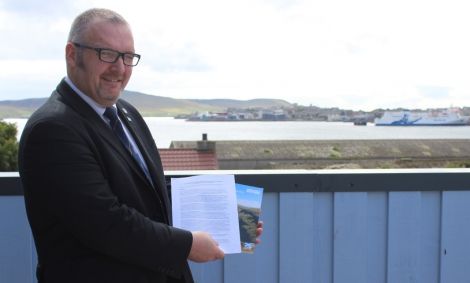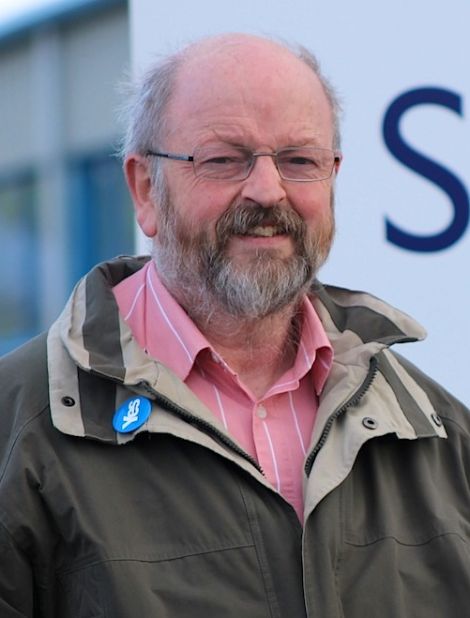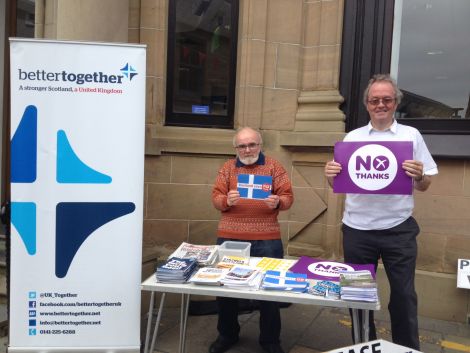Scottish Independence Debate / SIC to ‘strike while iron is hot’ to gain influence
SHETLAND Islands Council is determined to press home its case for more powers from both Westminster and Holyrood following last week’s referendum on Scottish independence.
That is the message from the local authority’s political leader Gary Robinson, who said many of the series of pledges aimed at providing Scotland’s islands with greater representation could still be delivered following Thursday’s No Vote.
Northern Isles MP Alistair Carmichael said following the count that he had immediately started work on implementing a framework set out in response to the Our Islands Our Future (OIOF) campaign by the three island councils.
It promised to “island proof” legislation before it was passed, provide a dedicated “desk officer” in the Scotland Office and greater representation in Europe.
Robinson said: “The OIOF campaign got commitments from both governments. We need to press home those commitments and ensure we reap the maximum benefits from them, to ensure we get the best deal from government for Shetland.
“I think we need to strike while the iron’s hot, while all of this is still fresh in people’s minds.”
On the night of the count Robinson said he felt a Yes vote would offer the greater opportunities for the islands, though he stressed that was a “non partisan” comment.
“Certainly the Yes vote would have opened up some very different opportunities for Shetland,” he said. “What was on offer was a written constitution for Scotland, and I believe that would have been helpful for establishing the framework of further devolution of powers to local authorities.”
While the SIC will be pressuring the SNP Government to deliver on offers it has made that did not rely on a Yes vote, its pledge to devolve 100 per cent of Crown Estate income from seabed-related activity to the islands will not now be delivered.
Become a member of Shetland News
Robinson said that “if there was a disappointment [with the UK Government’s package] it is there was very little at all on the Crown Estate. I think that’s something we want to revisit with the UK Government.”
Council convener Malcolm Bell said that “now that the dust has settled”, he hoped both sides would work together for a better Shetland.
“The debate has been balanced and carried out, in the main, in a well-mannered and dignified fashion,” he said. “A big winner has been the democratic process itself and it has been wonderful to witness the engagement throughout our community. A turnout of 85% was stunning.”
Bell said he expected both governments to “make good on the promises made” during the OIOF campaign.
“In terms of the Scottish Government, whilst some of their proposals were predicated on a Yes outcome, many more could easily be implemented now using devolved authority they already have, never mind what may now come as a result of further devolution from Westminster.”
He cited commitments including an act to ensure government legislation is “island-proofed” and the appointment of a minister for island communities.
Bell added: “Recent years have seen power and influence relentlessly removed from local communities. I hope this now marks the point where the tide finally turns and decision making and accountability is devolved… to the most appropriate level.”
Yes Shetland chairman Brian Nugent thanked the 5,669 isles voters who chose “hope over fear”, saying it was regrettable that “in Shetland we voted to remain in food bank Britain, in austerity Britain, with a Tory government ably supported by its Liberal accomplices. We’ll do this again in a few years when the people demand that we should do it.”
Nugent added he felt the campaign had been “good natured locally” and was respectful towards his opponents in Better Together Shetland.
Both sides had speculated that the split in Shetland would be nearer to 60-40 in favour of a No vote than the eventual 64-36 outcome.
Better Together campaigner Geordie Jacobson said he was “very pleased” with both the result and the “very fair campaign” in Shetland which had seen “none of the sort of aggro that there’s been elsewhere”.
He felt Shetland folk appreciated the importance of being “interdependent” part of a bigger entity that shared its resources.
But he acknowledged that many of those who voted Yes were probably not nationalists, but “simply disillusioned with the way things have been in the UK in the past years and decades, and I think again we have to look at that”.
Shetland MSP Tavish Scott said he was “very pleased that Shetland has supported a stronger Scottish Parliament but within the UK, and it’s my job and many other politicians’ job to make sure we deliver on the commitments made during the campaign”.
Scott added: “It’s the public holding politicians’ feet to the fire: about time too.”
Become a member of Shetland News
Shetland News is asking its many readers to consider paying for membership to get additional features and services: -
- Remove non-local ads;
- Bookmark posts to read later;
- Exclusive curated weekly newsletter;
- Hide membership messages;
- Comments open for discussion.
If you appreciate what we do and feel strongly about impartial local journalism, then please become a member of Shetland News by either making a single payment, or setting up a monthly, quarterly or yearly subscription.




























































